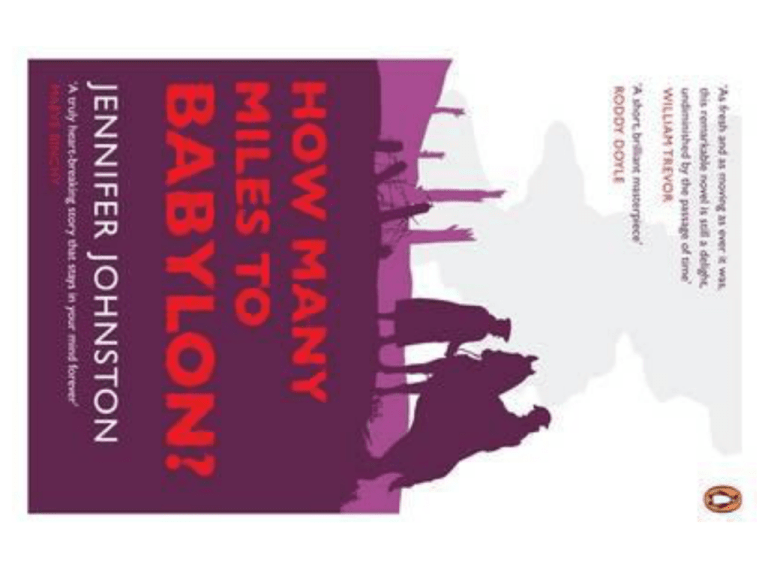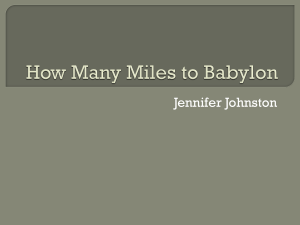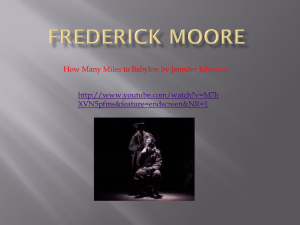ALEC MOORE - Miss O`Connor`s Class
advertisement

INTRODUCTION • • • • • The novel is set against the background of the First World War, 1914 – 18. It is set in Ireland but later changes to the Western Front in France. The novel opens with Alec in his jail cell waiting to be executed and the story of how he ended up in that situation is told through flashback. The story is told by Alec in the first person. The first-person narrative means that the reader sees the world as Alec would and sympathises with him throughout. The novel has dialogue that helps bring characters to life and also helps us to understand different relationships. Alec’s conversation with his father are distant and conversations with his mother are emotionless. The only normal conversations Alec has are with Jerry. The natural flow of their conversations suggests their closeness. The novel’s tensions arise from dysfunctional family relationships, the class barriers which affect Alec and Jerry’s friendship and Alec’s loss of personal identity when his parentage is questioned. Images are very important in the novel, enhancing its descriptive qualities. Images of the lake and swans recur throughout the story. How Many Miles to Babylon? presents a dark and depressing vision of life. There is little humour in this realistic and tragic story. However there are some aspects that are life affirming – some happy childhood experiences, friendships and loyalty. SUMMARY • The novel is the autobiography of Alec Moore, a young, aristocratic Irishman who lives with his parents, Alicia and Frederick Moore in one of the Great houses in County Wicklow, prior to the outbreak of World War One. Alec and his friend, Jerry Crowe, enlist in the army to fight in the war but as they belong to different social classes they are discouraged from maintaining their friendship by their superior officers. Disaster strikes when Jerry Crowe goes absent without leave and Alec tries to justify what is seen as Jerry’s desertion of the army. As he sits in his prison cell awaiting his own death sentence. Alec writes the story of his life and a description of how his friendship with Jerry began and developed. The book is not divided into chapters but is structured around significant events. SIGNIFICANT EVENTS A PRISON CELL CHILDHOOD JERRY CROWE A DREAM FOR THE FUTURE SIGNIFICANT EVENTS A THREATENED FRIENDSHIP PERSUASION TO GO TO WAR LAST NIGHT AT HOME GOODBYE TO HOME SIGNIFICANT EVENTS TRAINING FOR WAR FRANCE AT THE FRONT MAJOR GLENDINNING SIGNIFICANT EVENTS A DYING SOLDIER DISCOMFORT FROM THE TRENCHES DISCOMFORT FROM THE TRENCHES A LETTER FROM HOME SIGNIFICANT EVENTS MRS CROWE’S LETTERS JERRY GOES MISSING JERRY RETURNS A VIOLENT REACTION SIGNIFICANT EVENTS TWO SWANS A DEATH SENTENCE A MERCIFUL ACT AWAITING DEATH CHART THE DEVEOPMENT OF THE STORY – EXPLAIN RELEVANT POINTS TENSION/DEVELOPMENT INTRODUCTION CLIMAX CONCLUSION CHARACTERS – ALEC MOORE • • • • • • • • • • • Alec is the only child of a loveless marriage. Alec is capable of forming strong friendships. Alec is an honest individual. Alec is not as worldly wise as Jerry. Alec has a complicated relationship with his mother. Alec’s relationship with his father has the potential to become a strong one. Alec is a peace-loving individual who has no interest in going to war. Alec can be passionate and emotional despite his usual calm, placid manner. Ales is a sensitive person, who tries to help people when he can. Alec has deep inner strength. Alec is a man of immense courage and capacity for real love and friendship. CHARACTERS – ALICIA MOORE • • • • • • • • Mrs Alicia Moore is the beautiful but self-centred wife of Frederick Moore, a wealthy member of the Anglo-Irish upperclass. Alicia is a selfish and manipulative woman who interferes in people’s lives with total disregard for anybody’s welfare but her own. She regards her husband Frederick Moore as ‘an ineffective man’ and their marriage is extremely unhappy. Frederick has come to realise that his wife hates him. When they speak to each other it is in a cold and spiteful manner. Whatever instincts Alicia may have as a mother are cancelled by her peevish nature and vindictive personality. Alicia is a jealous woman. Alicia tells her son that she knows she ‘is not a nice woman’. Alicia wants her son to go to war because it would give her pleasure to see her husband upset and deprived of his son’s company is Alec were to volunteer. CHARACTERS – FREDERICK MOORE • Frederick Moore is a wealthy landowner and a member of the Anglo-Irish upper-class. • Frederick speaks in a faltering and hesitant manner and his stuttered observations can be unclear. • Alec feels affection for his father and in his own reserved way his father also loves his son. • Frederick’s life has been a lonely one. • When Frederick’s son does prepare to leave to go to war, that parting scene is very touching in its understatement. • Frederick is a flawed character. He is ineffectual and weak. He submits to his wife’s bullying and allows her to get her own way in everything. He allows her to constantly insult and undermine him. CHARACTERS – JERRY CROWE • • • • • • • • • Jerry Crowe is a local village lad, a Catholic boy from the native Irish community who mostly work as farm labourers or are small tenant-farmers. Jerry and Alec first speak and become friends the night Alec goes to the lake’s edge and is surprised to find that some trespasser is swimming in it. He then ‘recognised the shining, grinning face of Jerry’. Jerry is a good-humoured youth who lacks the sense of inhibition and selfrestraint that comes with Alec Moore’s social class and personality. When Jerry is still very young, he leaves school to work for a local farmer, a tenant of the Moore’s, and takes up the habits of the older men. Jerry likes to make fun of Alec’s inflexible lifestyle and the two boys often exchange good-natured banter about their different backgrounds and expectations. Jerry and Alec remain friends. Jerry joins the army for two reasons. He wants the money. ‘That’s what is driving me,’ he tells Alec. But there is another reason. He wants to learn soldiering in order to be able to use his skills for the nationalist cause in Ireland when the rebellion comes. Jerry’s compassionate nature comes to the fore when he receives the letter from his mother telling him his father is missing and asking him to find his father. Jerry is captured and sentenced to death. CHARACTERS – MAJOR GLENDINNING • • • • • • • • • Major Glendinning is the tough commanding officer in charge of the unit to which Alec and Jerry have been assigned. He is a professional soldier and believes in order and discipline. The most important thing as far as Glendinning is concerned is that his unit, and by extension the entire army is functioning properly. For this to happen, rigid army discipline must be ruthlessly enforced. Glendinning is a stereotypical rigid army officer. There is no room in his unit for normal friendships to exist between the officer class and the regular men. ‘Strict impersonal discipline’ is what he demands. Glendinning occasionally displays anti-Irish sentiments. Glendinning distrusts people’s motives. Major Glendinning can be brave. Alec remarks that he could never figure out ‘whether I hated him or respected him’. We must view Major Glendinning’s character in terms of his beliefs in the necessity of ‘army discipline’, then it is understandable that he would have no option but to have a deserter executed. Perhaps Glendinning is ruthless because he has lost his sense of humanity in the face of the horrors of the trenches. Glendinning orders that Jerry be executed by firing squad without any appeal. CHARACTERS – BENNETT • Bennett is a junior officer who joined Major Glendinning’s unit at Bailleul. • Bennett shows little respect for army regulations. • Bennett admits that his life has ‘been indescribably dull’ up to now and the war is ‘the best thing that ever happened’ to him. • Bennett represents those people whose views about the war were foolishly misguided. They thought war was about gallantry and bravery but it was really about horrors and inhumanity.











